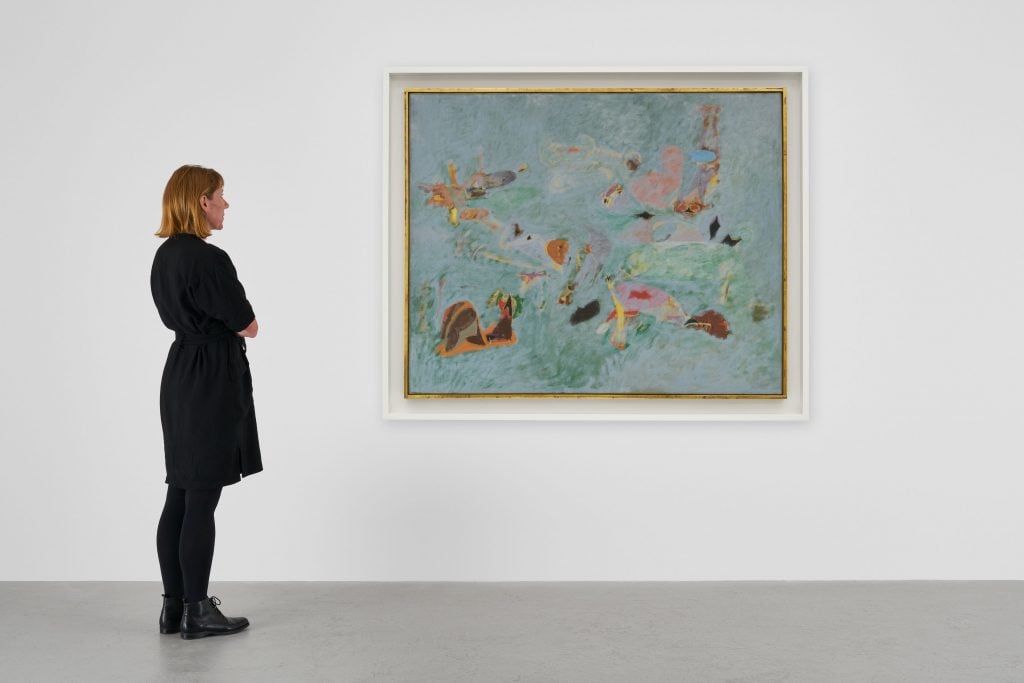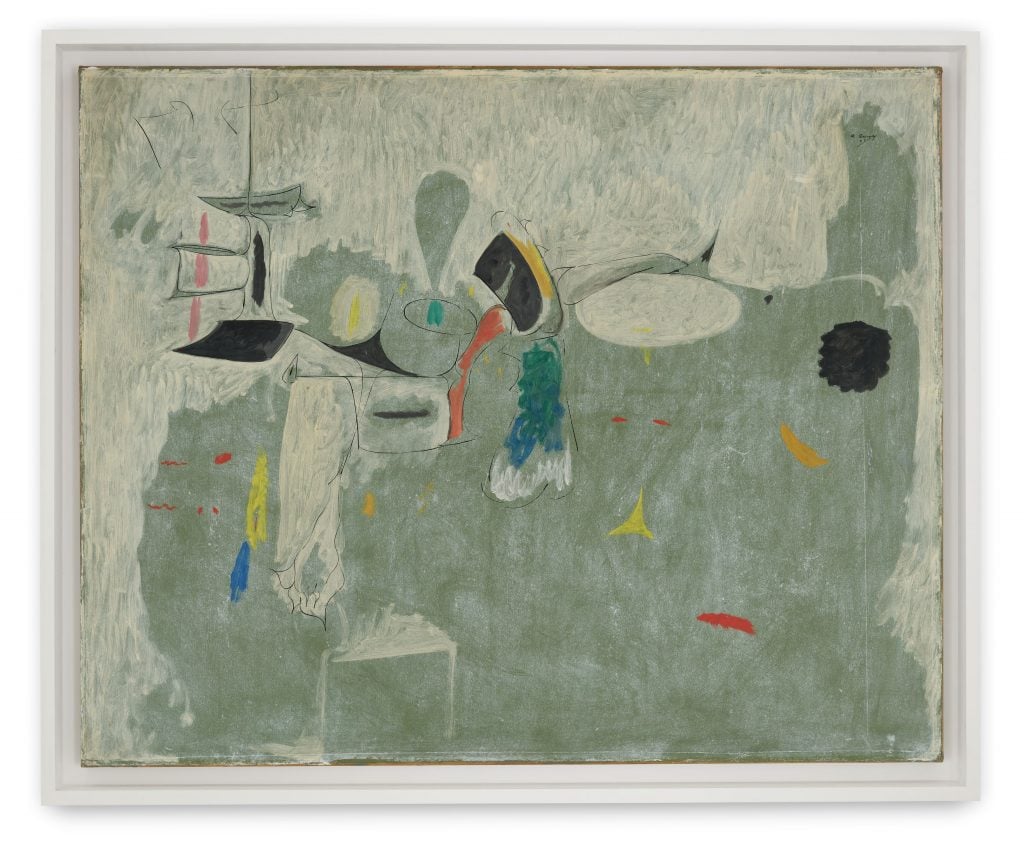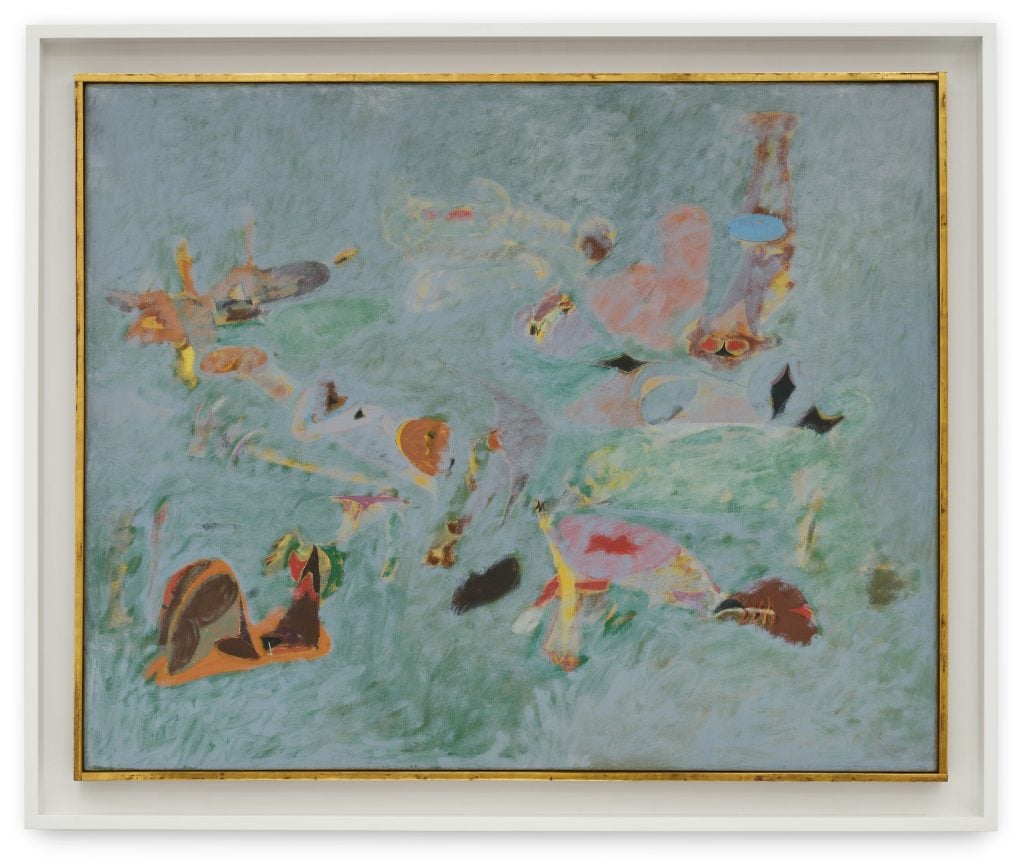Galleries
During Routine Maintenance, Conservators Discovered an Unknown Arshile Gorky Painting Hidden Behind a Work on Paper
The newly discovered work will go on view at Hauser and Wirth in New York next month.

The newly discovered work will go on view at Hauser and Wirth in New York next month.

Sarah Cascone

When the Arshile Gorky Foundation sent a work by the early Abstract Expressionist out for routine conservation, they got more than they bargained for: The single work came back as two after onservators discovered a painting hidden behind the later work on paper.
“This discovery is the sort of moment that drew so many of us to art in the first place—the wonder and surprise, the invitation to think beyond what we already know, hints of new horizons,” Marc Payot, president of Hauser and Wirth, which will debut the work in a non-selling exhibition in New York next month, told Artnet News in an email.
The painting, which has been dubbed Untitled (Virginia Summer), is being added to a new Gorky catalogue raisonné, due out this month from the artist’s foundation.
When Gorky finished the painting on paper, The Limit (1947), he was in quite a prolific period, making a new work every day. As a result, it appears he was short on materials, and, lacking a stretched canvas to work on, simply placed it atop the earlier work now identified as Untitled (Virginia Summer).

Arshile Gorky, The Limit (1947). Photo by Jon Etter, ©the Arshile Gorky Foundation/Artists Rights Society, courtesy the Arshile Gorky Foundation and Hauser and Wirth.
It’s quite possible that this isn’t the only painting the artist obscured this way. “Curators of museums: It’s not a bad idea to take it out of the basement or off the wall, look behind, and see if you’ve got two paintings instead of one,” Matthew Spender, the artist’s son-in-law and author of From a High Place: A Life of Arshile Gorky, told the New York Times.
Gorky used glue along the edges and kraft paper tape, an adhesive designed for easy removal, to affix The Limit onto the canvas, presumably as a temporary measure. But when the artist died the following year, Virginia Summer stayed covered, lost to art history for over seven decades.
Conservators Michaela Ritter and Olivier Masson of the Swiss restoration studio Masson and Ritter undertook the painstaking work of peeling back The Limit to reveal the painting underneath. They then constructed a new stretcher on which to safely display the delicate work on paper.

Arshile Gorky, Untitled (Virginia Summer) ca. 1946–47. Photo by Jon Etter, ©the Arshile Gorky Foundation/Artists Rights Society, courtesy the Arshile Gorky Foundation and Hauser and Wirth.
The find is all the more remarkable considering Virginia Summer was hanging quite literally in plain sight at some of the nation’s most prestigious museums. The foundation has loaned The Limit to both the National Gallery of Art in Washington, D.C., and the Philadelphia Museum of Art, the latter for a major retrospective of the artist in 2009 and 2010.
On the other hand, the discovery wasn’t entirely unexpected. Gorky’s daughters Natasha Gorky and Maro Spender had already noticed one of the corners of The Limit had come unstuck. Clearly, there was paint underneath.
Conservators had long been deemed too risky to try and see what was really under there, but with a lighter work schedule due to the pandemic, Ritter and Masson were able to take the time to do it carefully. As they worked, they came to realize the canvas contained a completed late masterpiece by the artist, an aqua-colored abstract canvas filled with biomorphic shapes.
At the time, Gorky was experimenting with new techniques, mixing oil and turpentine for a more fluid, expressive style.
“Gorky was incredibly inventive in his last years,” Payot said. “This painting gives us additional insight into his own revelations and wonder at that time. It’s thrilling for us to share a newly found masterpiece with the public, as well as scholars and artists who have long loved and been inspired by Gorky’s work.”
Because the work had never been exposed to light, the colors remained as vibrant and fresh as the day Gorky painted them. “[It was] like an explosion compared to The Limit,” Masson told the Times. “It was so well protected. I would say it’s in mint condition.”
“Arshile Gorky. Beyond the Limit” will be on view at Hauser and Wirth, 542 West 22nd Street, New York, November 16–December 23, 2021.